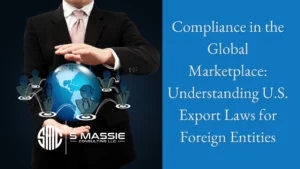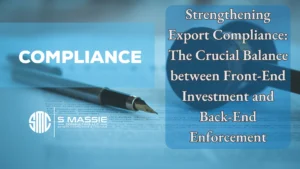A Comprehensive Guide for International Trade
Exporting goods and services can be a lucrative venture for businesses, opening up new markets and opportunities for growth. However, it is crucial to navigate the complex landscape of export compliance to avoid legal pitfalls and maximize profits. In this article, we will explore the importance of export compliance and provide valuable insights on how businesses can ensure their operations are in line with regulations while optimizing their export activities. So, let’s dive in!
In today’s global marketplace, businesses like yours are expanding their horizons by engaging in international trade to boost profits. However, this endeavor comes with its fair share of challenges, especially when it comes to export compliance. Don’t fret! In this comprehensive guide, we’ll delve into the nitty-gritty of export compliance and share strategies to maximize your profits while staying on the right side of the law.

Understanding Export Compliance
Export compliance refers to following the rules, regulations, and policies governing the export of goods and services across borders. It’s not something to take lightly, as non-compliance can lead to hefty penalties, loss of export privileges, and even legal trouble. So, it’s crucial to have a solid grasp of export compliance to protect your business and maintain a trustworthy reputation in the global market.
The Role of Government Agencies
Various government agencies, such as the Bureau of Industry and Security (BIS) in the United States, oversee export compliance. They enforce export controls and manage export licenses. Additionally, other agencies like the Department of State and the Department of the Treasury have their own regulations for specific goods and transactions.
Export Control Classification
To ensure export compliance, you need to classify your products properly to determine if they fall under any export control restrictions. The Export Control Classification Number (ECCN) system, administered by the BIS, helps identify items that require an export license. Accurate product classification is essential to avoid violations and penalties.
Ensuring Export Compliance
Complying with export regulations may seem daunting, but fear not! By implementing the following best practices, you can ensure export compliance while maximizing your profits:
Conducting Thorough Risk Assessments
Before diving headfirst into international trade, it’s crucial to conduct comprehensive risk assessments. Identify potential risks, such as prohibited destinations, restricted parties, and embargoed countries. By evaluating and mitigating these risks, you can steer clear of compliance violations and safeguard your business’s reputation.
Implementing an Effective Compliance Program
A well-structured export compliance program is essential for businesses engaged in international trade. This program should include written policies and procedures outlining the steps to ensure compliance with export regulations. Regular training sessions will keep your employees up to date with the ever-changing export control laws.
Utilizing Technology Solutions
In this digital age, technology can be your ally in streamlining export compliance processes. Export management software can automate tasks like screening for restricted parties, license management, and compliance record-keeping. Embracing technology will enhance efficiency and accuracy, ensuring smooth export compliance.
Seeking Professional Assistance
Navigating the complexities of export compliance can be challenging, especially for small and medium-sized enterprises (SMEs) with limited resources. Don’t hesitate to seek professional assistance from export compliance consultants or legal experts. They can provide valuable guidance to ensure compliance with export regulations.
Maximizing Profits in Export Operations
While export compliance is crucial, your ultimate goal is to maximize profits in international trade. Here are some strategies to help you optimize your export operations and increase profitability:
Conducting Market Research
Before venturing into new markets, conduct thorough market research. Dive deep into consumer preferences, local competition, and cultural factors. Understanding your target market will enable you to tailor your products and marketing strategies to meet customer needs, giving you a competitive edge.
Building Strong Relationships with Partners
Establishing robust relationships with suppliers, distributors, and other partners is vital for successful export operations. Trust and effective communication channels are the pillars of a smooth supply chain and an extended market reach. Collaborating with local partners can provide valuable insights into the target market and facilitate business expansion.
Optimizing Pricing Strategies
Pricing plays a critical role in export profitability. Striking the right balance between competitive pricing and maintaining profitability is key. Analyze market dynamics, including currency exchange rates and local purchasing power, to determine optimal pricing strategies that will maximize your profits.
Leveraging Free Trade Agreements
Free trade agreements (FTAs) can offer significant benefits to businesses involved in international trade. Familiarize yourself with the advantages provided by FTAs, such as reduced tariffs and streamlined customs procedures. By capitalizing on these agreements, you can enhance your competitiveness and expand your market reach.
FAQs
Non-compliance with export regulations can lead to severe consequences, including hefty fines, loss of export privileges, and even potential criminal charges. Moreover, it can tarnish your business’s reputation and hinder future growth opportunities.
To ensure accurate export classification, consult resources like the Commerce Control List (CCL) provided by government agencies. You can also seek professional assistance from export compliance consultants to ensure your products are classified correctly.
Export licenses are official authorizations from the government to export specific goods. Obtaining the necessary export licenses is crucial for complying with export regulations and avoiding penalties and legal complications.
Automating export compliance processes through technology solutions, such as export management software, enhances efficiency, accuracy, and productivity. It reduces the risk of manual errors and streamlines tasks like screening for restricted parties and managing licenses.
Identifying potential export markets requires thorough market research. Analyze factors such as consumer preferences, competition, market size, and growth potential. Trade shows, industry publications, and online databases are valuable resources for gathering market information.
Absolutely! Government agencies provide various resources to assist businesses with export compliance. For example, the BIS offers online training courses, guidelines, and advisory services to help businesses understand and comply with export regulations.
Conclusion
Export compliance is a critical aspect of international trade that demands your attention. By understanding and adhering to export regulations, implementing robust compliance programs, and leveraging technology solutions, you can navigate the complex export landscape while maximizing profits.
Furthermore, conducting thorough market research, building strong relationships, optimizing pricing strategies, and capitalizing on free trade agreements will enhance your profitability in export operations. Striking a balance between compliance and profitability will ensure your business thrives in the global marketplace, paving the way for sustainable growth.
S Massie Consulting LLC specializes in helping businesses comply with export regulations. The company provides tailored written export compliance programs that include policies and procedures to ensure that exports are compliant with applicable laws and regulations. Additionally, the company offers employee training programs designed to educate employees on the regulations and laws governing exports, making sure they understand their responsibilities and the consequences of non-compliance.


